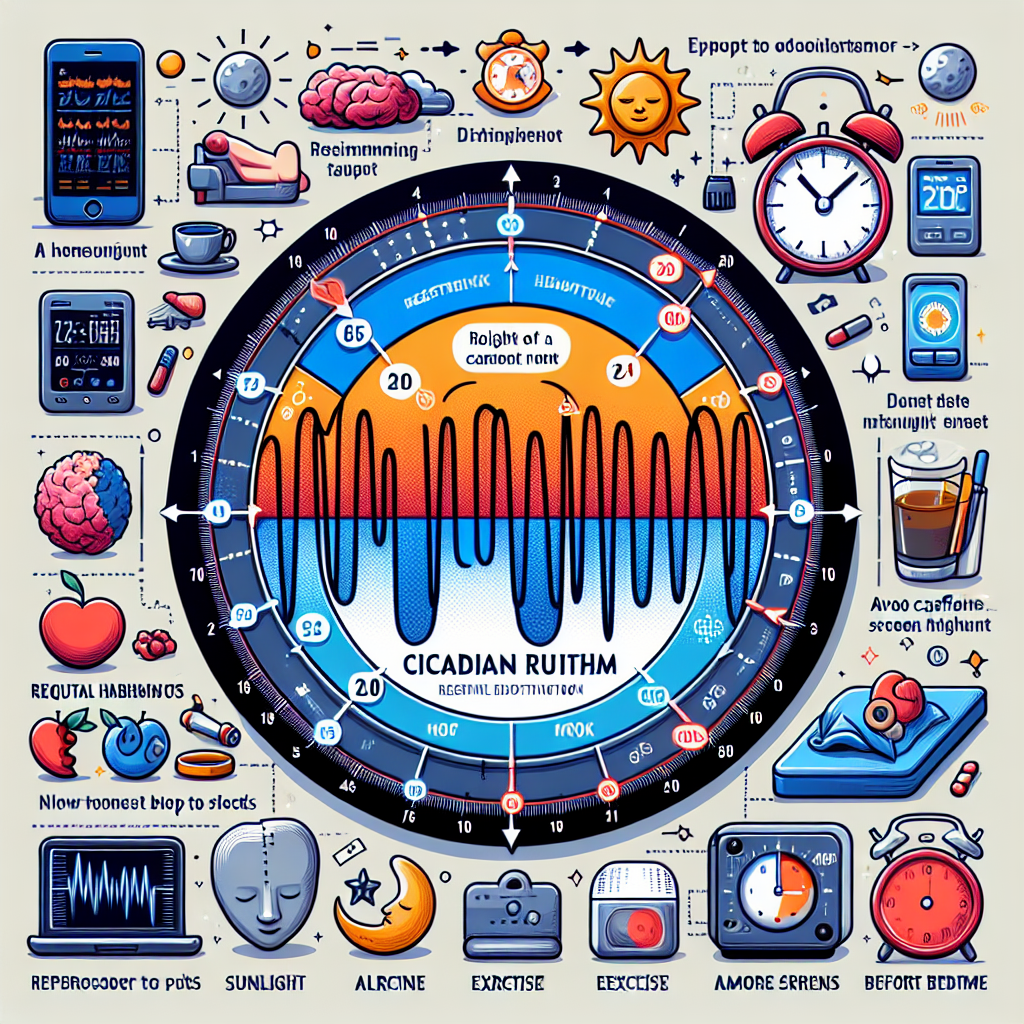Beginner’s Guide to Resetting Your Circadian Rhythm

Ready to reset your circadian rhythm and improve your sleep? Check out our Beginner’s Guide to Resetting Your Circadian Rhythm now! Click here to start your journey towards better sleep and overall health.
Understanding and Resetting Your Circadian Rhythm: A Beginner’s Guide
The circadian rhythm, often referred to as the “body clock,” is a natural, internal system that regulates the sleep-wake cycle and repeats roughly every 24 hours. It can refer to any biological process that displays an endogenous, entrainable oscillation of about 24 hours. These
Step-by-Step Guide to Resetting Your Circadian Rhythm for Beginners

The circadian rhythm, often referred to as the “body clock,” is a natural, internal system that regulates the sleep-wake cycle and repeats roughly every 24 hours. It can refer to any biological process that displays an endogenous, entrainable oscillation of about 24 hours. These
Beginner’s Guide to Mastering and Resetting Your Circadian Rhythm
The circadian rhythm, also known as your body’s internal clock, plays a crucial role in regulating your sleep-wake cycle. It influences your physical, mental, and behavioral changes over a 24-hour period. However, various factors such as jet lag, shift work, or poor sleep habits can disrupt this natural cycle, leading to sleep disorders and other health problems. This article serves as a beginner’s guide to mastering and resetting your circadian rhythm.
Understanding your circadian rhythm is the first step towards mastering it. This biological process is controlled by the suprachiasmatic nucleus (SCN), a group of cells in the hypothalamus. The SCN responds to light and dark signals, adjusting your body’s clock accordingly. When it’s dark, your body produces more melatonin, a hormone that makes you sleepy. Conversely, when it’s light, melatonin production decreases, making you feel awake.
However, modern life often interferes with this natural process. Artificial light, especially from electronic devices, can trick your SCN into thinking it’s still daytime, disrupting your sleep-wake cycle. Similarly, irregular sleep schedules due to shift work or travel across time zones can throw off your circadian rhythm.
Fortunately, there are several strategies you can employ to reset your circadian rhythm. One of the most effective methods is light exposure. Try to get plenty of natural sunlight during the day, especially in the morning. This can help reset your internal clock, promoting alertness during the day and better sleep at night. If you can’t get outside, consider using a light therapy box, which mimics outdoor light.
In contrast, it’s essential to limit your exposure to artificial light in the evening. Avoid screens for at least an hour before bed, and use dimmer switches or low-wattage bulbs to reduce the light in your home. You might also consider wearing glasses that block blue light, which is particularly disruptive to your circadian rhythm.
Another effective strategy is maintaining a consistent sleep schedule. Try to go to bed and wake up at the same time every day, even on weekends. This can help regulate your circadian rhythm and improve your sleep quality. If you’re struggling to fall asleep at night, avoid napping during the day, as this can make it harder to sleep at night.
Diet and exercise also play a role in regulating your circadian rhythm. Regular physical activity, especially in the morning, can help reset your internal clock. However, avoid intense workouts close to bedtime, as they can interfere with your sleep. Similarly, try to eat meals at regular times each day, and avoid heavy meals and caffeine close to bedtime.
Lastly, consider seeking professional help if you’re struggling to reset your circadian rhythm. Sleep specialists can provide personalized advice and treatment options, such as cognitive-behavioral therapy for insomnia (CBT-I) or chronotherapy.
In conclusion, mastering and resetting your circadian rhythm can significantly improve your sleep quality and overall health. By understanding how this internal clock works and implementing strategies to regulate it, you can align your body’s natural rhythms with your daily schedule. Remember, consistency is key, and it may take some time to see results. However, with patience and persistence, you can reset your circadian rhythm and enjoy better sleep and improved well-being.